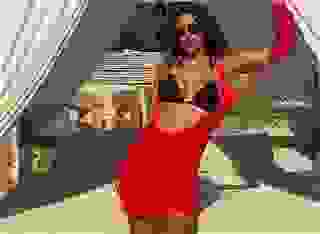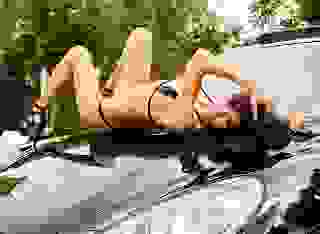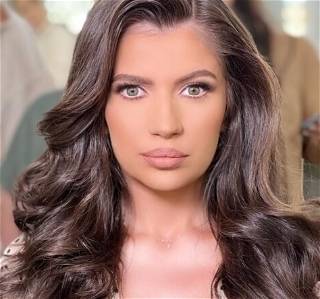- Loving Wives
- What You Wish For Pt. 03
Note: You can change font size, font face, and turn on dark mode by clicking the "A" icon tab in the Story Info Box.
You can temporarily switch back to a Classic Literotica® experience during our ongoing public Beta testing. Please consider leaving feedback on issues you experience or suggest improvements.
Click hereIntroduction
No sex here. Sorry. If anything, this chapter's a touch boring. Either way, it sets up everything that happens for the rest of the story. So please be patient if you're still with me in this long ride.
Thanks for reading, and please comment.
CHAPTER EIGHT
It was mid-July before I heard back from Natalie.
"Well that didn't take very long," she said from her air conditioned office in Florida.
"What didn't take very long?" I asked.
"Selling the book."
I was speechless. She'd found a publisher? In, what, not even a month?
"You still there?" she said, laughing.
"Who bought it?"
"The publishing rights or the movie rights?"
"Movie rights?" I said. Someone was going to make a movie out of my book?
She laughed, then choked on the cigarette she must've been inhaling during her laugh.
"Settle down, kid," she said. "No one's bought it yet."
I felt like a deflated balloon. Pop. That fast.
"We're in the middle of a bidding war," she continued.
"Which is?"
"When something's real good, when they think it's really gonna take off, the publishers all bid on the book. Then I go back to them. Kind of like an auction through five or six dozen phone calls."
"And this is good?"
"Oh yeah," she gasped, coughing again. "It's real good."
"And the movie thing?"
"Same deal. Four different producers are bidding on the option."
"Option?"
"Yeah. The book takes off, becomes a hit, they can exercise their option to buy the film rights."
"How'd they hear about the book?" I said. "Find out it was . . . well, worth a damn?"
"They have people at the publishing houses that keep 'em in the loop."
"So what're we talking here?" I said.
"Money?"
I was silent, afraid to say more.
"Well, kiddo," she said, her voice getting serious, "you'd better please tell me you're already working on something else."
"Almost done with the outline," I said.
"And it's a Lieutenant Randolph thriller?"
"Actually," I said, "it is. I liked him. He's a good character."
I could hear her sigh of relief through the phone.
"Thank you God," she said. "That's going to drive up the bidding."
"Why?"
"Because," Natalie replied, "everyone agreed he's a great character. Complex, sullen, but likeable. And smart as a whip and manly, too. That helps sell this to the female crowd."
"Oh," I said, not really understanding.
"And," she continued, "just like in the movies, publishers want to bank on a proven star. They like series books. You know. Jack Reacher, Inspector Rebus, Hercule fucking Poirot. Just like we've now seen, what, about a million Friday the Thirteenth movies?"
"Oh," I said, getting it now. "Well, that shouldn't be a problem."
"Good."
"So," I said, again afraid to ask.
"Well," she said, choosing her words carefully, "if it comes down the way it's looking, you're gonna be doing nothing but writing about our little friend Lieutenant Randolph for a long time. They're talking a three-book deal."
"And?"
"And you're gonna be a millionaire," Natalie said. "Several times over if they make any movies from the books."
My eyes damned near bugged out of my head at that one. Sure, I knew it was lucrative if you reached the bestseller list. Still, a millionaire right off the bat?
"So get your ass moving on that outline, okay?"
"Sure thing, boss."
"And one other thing," she said.
"What?"
"I've got your editor–the one in Chicago–lined up to help you with this."
"Oh?"
"Yep."
"So who is he?"
"She," Natalie corrected me. "She's from Chicago. We use her sometimes. I'll give her your number. You get together with her. Quick as you can. You two get this into final form as soon as possible, okay?"
"Sure," I said.
"Okay then," Natalie said with finality.
"Wait," I said before she could hang up. "This editor. What's her name?"
She laughed. "Oh yeah. I suppose that would help." She coughed again, a longer fit. "It's Marisa Key. You'll like her."
I heard her laughing at the last comment as she hung up.
Marisa Key? I'll like her? And that's funny?
* * * * *
The next morning, bright and early over coffee, my cell phone rang.
"Who's that?" Dad said, still reading the paper while nibbling on toast.
"Dunno," I said, not recognizing the 773 number before flipping open the cell phone. "Hello?"
"Tyler Collins?" she said. The voice was indescribable. Somewhere between deep and high without being in between. And there was a lilt to it, just the way she said my name. It came out as half question, half statement.
"Speaking," I said.
"This is Marisa Key," she continued. "Your editor."
"Ms. Key," I said. "I've been expecting you."
"What does your day look like?" she said, skipping the small talk.
"Oh, uh, give me a sec." I covered the mouthpiece and looked at Dad. "What's today look like?"
"We're caught up," he said, still reading the paper. "Maybe a few hours in the morning, but nothing major."
"I'm wide open from eleven on," I said back into the phone.
"Fine," she said. "I'll be there at eleven thirty."
"You're coming here?" I said, glad I wouldn't have to drive to Chicago.
"Yes," she confirmed. "Are there any hotels in–where are you again?"
"Grant City," I said. "And yes, we have hotels here. Two of 'em."
"Fine. Then I'll be there by eleven thirty."
"At the hotel?"
"At your house," she said, agitation surfacing at the unnecessary talk.
"You know where I live?"
"Yes."
"Okay then," I said.
She disconnected without another word.
What was Natalie foisting upon me?
* * * * *
By eleven fifteen, Dad was gone to visit Mom, and I'd showered the fine sheen of walnut dust off of my skin and out of my hair. I was changed into clean khaki slacks, a light blue oxford dress shirt with cuffs rolled to accommodate the summer heat, and boat shoes, no socks. I was putting the final touches on combing my damp and unruly hair when the doorbell rang.
Marisa Key was early.
I ran the comb through one final time, checked that I'd shaved closely enough, then bounded to and down the stairs.
Why am I hurrying like a tardy schoolboy? I though, forcing myself to slow down as I approached the door. Because her voice on the phone, her no nonsense manner, left me feeling like I was meeting my second grade teacher, I realized.
I opened the door, though, and saw that Marisa Key would never be mistaken for a second grade teacher. Lou Reed groupie maybe, but never a schoolmarm.
"Mr. Collins," she said in that indistinguishable accent.
I nodded and stepped back, looking her up and down as I did so. She was nearly as tall as me, maybe five nine, with impossibly long legs and long, sinewy features. And skinny, too. Painfully so. Like a runway model who lives on bottled water and fat free crackers–"Just two, thank you." Her hair was short, but thick and spiked, kind of like she'd stuck her finger in an outlet. Her face was part waif, part Cherokee Indian with a hint of Asian thrown in the mix. Face angling in a vee to a small chin, high cheekbones, small yet full Cupid's bow lips, tiny, pert nose, and large, deep brown eyes slanted at the corners to give the hint of Asian.
All told, Marisa Key could've been a runway model. She certainly had the build, the exotic features, and the long, awkward, gangly stride of a newborn foal.
Yet, all of this clashed with her wardrobe and makeup. Her clothes were straight from a punk rock concert. Tight black jeans, black leather motorcycle boots with metal studs, tight t-shirt ending two inches above her jeans to reveal the sharp, jutting hipbones of the terminally skinny and the hint of a tatoo of unknown design, studded black leather bracelets on her wrists, and a large black leather bag slung over her shoulder. Her makeup only embellished this. Black mascara, lipstick, and nail polish and a diamond stud in her left nostril.
The overall look made it impossible to guess her age. She could've passed for sixteen, but she could also be my age.
"Where shall we work," she said, ignoring my roaming eyes and the astonished look that I know was plastered on my face.
"Uh . . . I . . . ."
"Do you have a dining room table?" she said.
I nodded, focusing my stare on her impossibly dark brown eyes.
"Can you run a chord to your laptop from there?"
"Uh, yeah," I managed. "Sure."
"Fine," she said, turning toward the kitchen and seeking out the dining room. "Get your laptop and bring it to the table."
I obeyed.
A few minutes later, I had the laptop fired up and we were seated at the table. She pulled the laptop in front of her and motioned for me to slide closer so we could both see the screen.
"Okay," she said once I'd booted the final version of Long Gone, "time to get to work."
She reached into her black bag and pulled out a tattered copy of the Long Gone manuscript. It was huge, at least six inches thick, bound together with several thick rubber bands, and compounded by hundreds of yellow post it notes stuck throughout the manuscript.
"You've already read it?" I said, watching her pull the rubber bands off.
"Of course."
"What did you think?" I said, fishing for a compliment.
She turned and stared at me, though. Her look said it all: You're wasting my time.
"You're a capable writer, Mr. Collins," she said.
"Tyler," I said automatically. Then I paused.
"Just capable?"
She made a face. "That's better than most."
"Really?"
"Really," she said, fanning the first ten pages in front of us. "Now can we get started?"
"Sure."
"Good," she said, emphasizing that we wouldn't be wasting any more time.
And we didn't. Jesus, what's to say? She'd had the manuscript for a week, and the whole thing was littered with her notes. Notes on little things. Isn't there a better word to use here? What're you saying here? Is this the best way to say it? Tighten this passage up. You're letting the conflict wane here. The tension's dying.
And that was just the first sixty pages, which took us until six thirty to complete. In seven hours, we took two potty breaks and she took three smoke breaks, standing on the back porch staring into the distance while she huffed down her cigarettes. I tried to engage her in conversation during her first smoke break, but her look told me that wasn't such a hot idea.
I had to admit, though: She was good. Fucking brilliant, actually. I was amazed at the improvement when I reread the first fifteen pages against my final manuscript–the manuscript that was probably going to make me a millionaire. The changes were subtle. A word here, move a sentence there, make the dialogue more vague here and more explicit over here. The overall effect was magical, though. It was really a massive improvement.
"Well," she said, pushing herself back from the table as I read our changes. Okay, her changes.
"Enough for one day?" I said.
She nodded. "I'm hungry. Are there any decent restaurants in this town?"
I smiled.
"Well?" she said.
"Can I take you to dinner?"
She shook her head. "That won't be necessary, Mr. Collins."
"Probably not," I said. "But I want to."
Her look told me to back off, which made me try all that much harder.
"Listen," I said, "I really want to talk about this. About you. How you do this. So if you don't mind, I'd like to take you to dinner."
She fixed me with her stare, her lips set tight, and said nothing.
I decided to wait her out, trying to put on an eager, innocent face as I did so. After a moment, that caused a flicker at the corner of her lips, the closest thing to a smile I'd seen from her all day.
"Fine," she said, reaching over and bundling up the loose pages of manuscript into a tidy pile. "Then we'll make it a working dinner. We should be able to get another ten pages done."
I tried to convey with my body language and fallen face that this wasn't what I had in mind, but she ignored me.
"Bring the laptop," she said, pushing away from the table and slinging her bag over her shoulder.
I obeyed.
Again.
* * * * *
Any thoughts that Marisa Key was an anorexic were quickly dispelled over dinner. I watched her steadily plow through a bowl–not a cup–of gazpacho followed by a main course of Mexican stuffed meatloaf with grilled zucchini and chipotle-cheese smashed potatoes. When she was finished, the plate looked like it had just come out of the dishwasher.
"Still hungry?" I said, looking at my half-eaten braised brisket sandwich with a side of fresh fruit.
"Sure," she said, sliding her plate out of the way and sliding mine in front of her.
And the whole time she ate, we kept editing the manuscript.
It was going faster now as I learned to trust her advice and she figured out my own predilections for sentence construction and word choice.
The waitress approached as Marisa finished the last of the fruit. It was Nicole. She and her husband owned the place. She took one look at the plates, then a glance at Marisa.
"Dessert?"
"What do you have?" Marisa asked, not bothering to look up from the laptop she was pecking away on.
Nicole's look was disbelief. I could only give a slight shrug and smile in response.
Nicole gave the dessert choices, and Marisa chose the Bananas Foster over cinnamon ice cream.
"Two spoons?" Nicole said.
Marisa looked at her, then at me. "Do you want some, Mr. Collins."
I just smiled and shook my head. "Just coffee, please."
Nicole almost burst out laughing, but Marisa didn't notice.
"Would you please stop calling me Mr. Collins?" I said.
"It's your name," she replied, pointing at the manuscript. "What about this?"
"I prefer Tyler," I said, not to be deterred. "I mean, we're probably about the same age, right?"
"Whatever," she said, the impatience showing again. "Fine. Tyler. I'll call you Tyler, okay? So, Tyler, what should we do here? Tyler?"
"Yeah," I said, smiling at her petulance. "Fine. Let's change it."
"How?"
"What's your idea?"
"To get you to tell me how to tighten it," she said, her speech going slow.
"No," I said. "I wanted to have dinner to get ideas on how to edit my work better. Instead, we've spent the evening doing more editing without you really telling me anything. So I want to know how you'd do it, and I want you to tell me why. Hell, I want you to tell me how you even saw this . . . this . . . the flaw here."
She frowned, then looked at the laptop and saved the work, both on the internal hard drive and on a flash drive. Flipping the laptop shut, she pushed it aside and again bundled up the manuscript, which she stacked on top of the laptop and pushed it aside just in time for Nicole to place her dessert in front of her.
Picking up her spoon and taking a bite, she turned to me. "Okay, shoot. What do you want to know?"
"How old are you?"
"Twenty-five."
"How'd you get into this? Editing?"
"I'm in the graduate school at Northwestern. Working on my doctorate. This pays the bills."
"Major?"
"English and creative writing."
"Have you written anything?"
Her face gave a brief flash of anger at this one, and she said nothing.
"So how long have you been editing professionally?"
"Four years."
"Why do you do it?"
"Like I said, it pays the bills. School's not cheap, you know."
I nodded.
"How long did it take you to go through and damned near tear apart every page of my manuscript?"
Her eyes narrowed.
"There's no need to be offended," she said. "It's my job."
"I'm not offended," I protested. "I'm curious. Jesus, I spent two months editing this, and you just got it last week. So how long did it take?"
"Three days," she said, shoveling more Bananas Foster into her mouth. "This is good, by the way. You sure you wouldn't like some?"
"No, I'm fine," I said, but she already had a spoon full of ice cream and caramelized banana in front of my mouth.
"Really," she said. "Try it."
So I rolled my eyes and tried it.
"You're right," I said, taking the spoon from her and taking a piece of the banana glazed with caramel and melted ice cream.
She flashed a smile, the first true smile of the day.
"Listen," she said as we shared the rest of the dessert, "I got it in on Sunday morning. I spent seventeen, eighteen hours a day for three days."
"So what's the first thing you did?"
"Read the whole thing. Twice."
"You a speed reader?"
She shook her head. "Fast, but not really a speed reader. And it goes faster the second time anyways. You know what you're reading. The second time, I start making notes of where the plot's getting weak, if a word or phrase jars me, something's unclear. You know."
I nodded. I thought I knew. I thought I knew real well until I'd met with her and seen her find mistakes every other page of my manuscript. Now, I realized, I didn't know shit.
"And after that?"
She scooped up the last bite of dessert and held her spoon toward me. I waved it off to her obvious delight.
"After that," she said, "I just keep going over it."
"So how many times did you go over it?"
She shrugged. "Dunno. Twelve. Maybe fourteen. A lot."
"They pay you well for this?"
She hesitated before answering. "Well enough."
"Covering your expenses while you're here?"
She shook her head. "They want me to drive to and from Chicago every day. Not practical, though."
I pulled my cell phone out.
"Who're you calling?" she said, her eyes going wide.
"They're paying for your room," I said. "And a meal allowance."
She shook her head frantically, reaching over to take the cell phone from me. I turned my shoulder to block her out.
"Natalie," I said when she answered.
"Hello, Tyler," she croaked. I'd never seen her, but I could picture Thelma Diamond, the old bailiff on Night Court, chain smoking cigarettes while talking to me.
"Marisa's here," I said.
"Good," she chuckled. "And?"
"And she needs the publisher–whoever that's gonna be–they need to pay for her room and meals while she's here."
"But she's only an hour away," Natalie protested.
"Which is two hours a day wasted on driving when it could be spent on getting this thing done," I said.
Natalie was silent for a moment before speaking.
"You willing to put everything aside until this is done?"
"Yes," I said, looking at Marisa glaring at me.
Natalie sighed. "Fine. After all, what's a room cost in Podunk, Illinois?"
"And Natalie?"
"What?"
"This was at my insistence," I said, staring right back at Marisa as I spoke. "Marisa's pissed off I'm even asking for this, okay?"
Natalie laughed her wheezing laugh. "Told you she's a pistol."
"No," I said, "you told me nothing. Just a vague warning that has proven all too true."
Natalie seemed to think that was the funniest thing she'd heard all day. She was still laughing aloud when I clicked the phone shut.
"You have school to pay for," I said, sliding the phone into my pocket. "The thousand or so in rooms and meals is better borne by those who can better afford it, okay?"
But the glare didn't leave her face. Instead, she stomped off to the restroom, then returned and bundled all of her things up.
"Eight o'clock," she said, staring down at me. "See you then."
* * * * *
By late the next day, we'd plowed through another seventy pages of the manuscript, going back to make additional changes in the first sixty pages as we did so. By the end of the afternoon, I was wiped, mentally and physically.
"Enough," Marisa said, her face impassive as I rubbed the exhaustion from my eyes.
I nodded.
"Tomorrow then," she said, standing and scooping everything back into her bag.
"Wait," I said, reaching out to her arm.
She jerked it away and glared at me.
"What," she glared.
"Why're you so pissed?" I said. "All fucking day you've been . . . well, pissed."
"You shouldn't have done that," she said.








